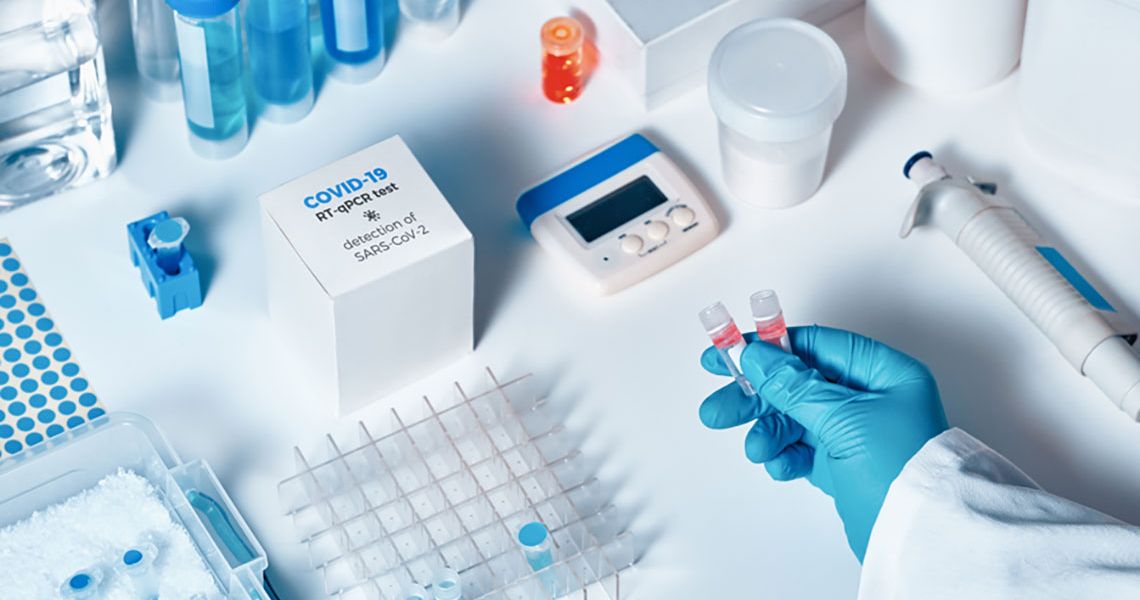As Naval Hospital Bremerton, in Bremerton, Washington, began to respond to the COVID-19 pandemic, there was an increased demand to be prepared to provide testing for those in need. That required hospital to quickly identify the specific media that was needed for testing, how to store for transport, and collection methods. Edmond Flores, a graduate student in George Washington University School of Medicine and Health Sciences (SMHS) and supervisor of microbiology at Bremerton, knew just what needed to be done and snapped into action, collaborating with military medical partners and reference labs to help boost the testing capacity.
“This was an ever-changing experience,” said Flores, who is participating in the SMHS Online Master’s in Molecular Diagnostic Sciences program. “The entire country was in the same predicament and testing along with testing media became scarce.”
Flores not only helped to coordinate the changing dynamic in testing in his laboratory, but also for all hospital staff. Soon, the hospital had its own testing system online, another effort Flores helped take the lead on.
He said at first the situation was stressful, but added that he knew he was going to be relied on for his expertise and the results he and his colleagues were able to produce.
Flores is just one of many students from GW Health Sciences making a profound impact on the front lines of COVID diagnostic testing and research. They are students in the Bachelor of Science in Health Science Medical Laboratory Science (MLS) program, post-baccalaureate certificate students in MLS, and Master of Science in Health Science MLS students. Even dozens of graduates from these programs are making their mark in COVID efforts.
More than 2,000 miles southwest from Bremerton, where Flores works, Bethany Landry, also a student in the Molecular Diagnostic Sciences program, is busy processing and analyzing hundreds of COVID-19 testing swabs as a medical technologist at the University of Texas Health Science Center in San Antonio.
She said some days can be more hectic than others, as demand ebbs and flows. Her days are spent under a biosafety cabinet, where she preps the viral transport medium (VTM) for testing, filling lysis tubes with the samples to be loaded on the Panther Fusion instrument, which helps detect the presence of COVID-19.
Her courses at GW, she said, are preparing her well for the busier days. “I have been able to understand the technical aspects of the testing assay better, allowing me to troubleshoot issues with the samples or instrument more effectively,” she noted, adding that she’s glad she can play a part in helping patients during this trying time.
For Flores, almost every course he has taken toward his degree has helped prepare him in some way for the work he is doing now. His epidemiology course offered skills for tracking COVID-19 spread in the community and across the country, information he was able to share with his lab to look ahead to what possibilities could happen next.
“I have even reached out to some of my former classmates for advice or help in areas that I may need more information on,” he added. “The GW community has helped since the beginning; from words of encouragement from our instructors to daily emails on the transparency of how GW is keeping students safe.”
SMHS graduate student Michal Rymaszewski, who works at Molecular Research Center Inc. in Cincinnati, Ohio, is currently researching the development of a highly effective new method for real-time reverse transcription polymerase chain reaction-based COVID-19 testing.
“The opportunity to engage in research directed at increasing our collective ability to deal with the pandemic is very exciting,” he said. “There is a sense of urgency, the anticipation of reviewing the experimental results, the sense of immediate relevance, and the feeling of being present in the moment.”
He added that just a few days into his research work on COVID-19 testing, he realized he wanted to transition to the clinical setting. Rymaszewski immediately applied to the SMHS Molecular Diagnostic Science Program.
“I am only in my first semester, but being part of the GW community is very grounding,” he said. “The pandemic provided a different perspective and clarified the direction in which I wanted my professional life to go. The GW program is providing me with the tools to make this transition.”



